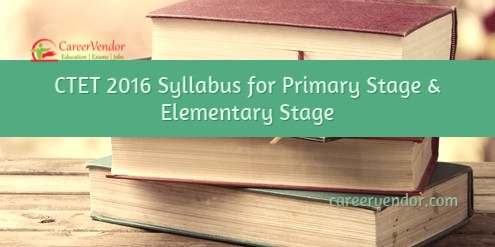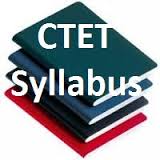CTET Syllabus 2016: Central board of secondary education (CBSE) is the first educational board that was set up in India. Many schools and colleges were affiliated to this board all over India. Along with exams at the end of academic year for the students they also conduct various other examinations for eligibility top various job role. Central teacher eligibility test (CTET) is the competitive examination that was held to the candidates who want to appoint as a teacher for class I to class VIII. CBSE CTET exam was conducted twice a year. Students who qualify in this examination will receive a CTET certificate which was valid for seven (7) years. Candidates without qualifying in this exam can’t be appointed as a teacher in Govt. CBSE schools.
- Click here for CTET Syllabus 2016 for Elementary Stage
- Click here for CTET Previous Year Solved Papers (Last 5 Years)
- Click here for CTET Syllabus & CBSE Exam Pattern
We are providing you a full information about CTET and CTET Syllabus for Primary Stage. In CTET Exam, there are two papers provided in this examination. Primary Stage (Class I to V) is called paper-I and Elementary Stage (Class VI to VIII) is known as paper-II. The paper-I was held in morning shift and paper-II was conducted in evening shift.
Central board of secondary education conducts written examination to the candidates to test their ability. We are also providing you a CTET Syllabus and Exam Pattern direct download link, you can download CTET Syllabus in pdf file by clicking on the link which is given below.
There will be two paper of CTET Exam. Paper I will be for a person who intends to be a teacher for classes I to V and Paper II will be for a person who intends to be a teacher for classes VI to VIII. The question paper will be objective type and have no negative marking. Applicants are advised to detailed syllabus of class I to VIII, please refer to the NCERT textbooks. The latest CTET syllabus 2015-16 are given below according to the CBSE :

CTET 2016 Syllabus of Primary Stage Exam:
- Child Development and Pedagogy [ 30 Question ]
Child Development (Primary School Child) [ 15 Questions ]
- Concept of development and its relationship with learning.
- Principles of the development of children.
- Influence of Heredity & Environment.
- Socialization processes: Social world & children (Teacher, Parents, Peers).
- Piaget, Kohlberg and Vygotsky: constructs and critical perspectives.
- Concepts of child-centred and progressive education.
- Critical perspective of the construct of Intelligence.
- Multi Dimensional Intelligence.
- Language & Thought.
- Gender as a social construct; gender roles, gender-bias and educational practice.
- Individual differences among learners, understanding differences based on diversity of language, caste, gender, community, religion etc.
- Distinction between Assessment for learning and assessment of learning; School-Based Assessment, Continuous & Comprehensive Evaluation: perspective and practice
- Formulating appropriate questions for assessing readiness levels of learners; for enhancing learning and critical thinking in the classroom and for assessing learner achievement.
Concept of Inclusive education and understanding children with special needs [ 5 Questions ]
- Addressing learners from diverse backgrounds including disadvantaged and deprived.
- Addressing the needs of children with learning difficulties, ‘impairment’ etc.
- Addressing the Talented, Creative, Specially abled Learners.
Learning and Pedagogy [ 10 Questions ]
- How children think and learn; how and why children ‘fail’ to achieve success in school performance.
- Basic processes of teaching and learning; children’s strategies of learning; learning as a social activity; social context of learning.
- Child as a problem solver and a ‘scientific investigator.’
- Alternative conceptions of learning in children, understanding children’s ‘errors’ as significant steps in the learning process.
- Cognition & Emotions.
- Motivation and learning.
- Factors contributing to learning – personal & environmental.
2. Language I. [ 30 Questions ]
Language Comprehension [ 15 Questions ]
- Reading unseen passages – two passages one prose or drama and one poem with questions on comprehension, inference, grammar and verbal ability (Prose passage may be literary, scientific, narrative or discursive).
Pedagogy of Language Development [ 15 Questions ]
- Learning and acquisition.
- Principles of language Teaching.
- Role of listening and speaking; function of language and how children use it as a tool.
- Critical perspective on the role of grammar in learning a language for communicating ideas verbally and in written form.
- Challenges of teaching language in a diverse classroom; language difficulties, errors and disorders.
- Language Skills.
- Evaluating language comprehension and proficiency: speaking, listening, reading and writing.
- Teaching- learning materials: Textbook, multi-media materials, multilingual resource of the classroom.
- Remedial Teaching.
3. Language – II [ 30 Questions ]
Comprehension [ 15 Questions ]
- Two unseen prose passages (discursive or literary or narrative or scientific) with question on comprehension, grammar and verbal ability.
Pedagogy of Language Development [ 15 Questions ]
- Learning and acquisition.
- Principles of language Teaching.
- Role of listening and speaking; function of language and how children use it as a tool.
- Critical perspective on the role of grammar in learning a language for communicating ideas verbally and in written form.
- Challenges of teaching language in a diverse classroom; language difficulties, errors and disorders.
- Language Skills.
- Evaluating language comprehension and proficiency: speaking, listening, reading and writing.
- Teaching – learning materials: Textbook, multi-media materials, multilingual resource of the classroom.
- Remedial Teaching.
4. Mathematics [ 30 Questions ]
Content [ 15 Questions ]
- Geometry
- Shapes & Spatial Understanding
- Solids around Us
- Numbers
- Addition and Subtraction
- Multiplication
- Division
- Measurement

- Weight
- Time
- Volume
- Data Handling
- Patterns
- Money
Pedagogical issues [ 15 Questions ]
- Nature of Mathematics/Logical thinking; understanding children’s thinking and reasoning patterns and strategies of making meaning and learning.
- Place of Mathematics in Curriculum
- Language of Mathematics
- Community Mathematics
- Evaluation through formal and informal methods
- Problems of Teaching
- Error analysis and related aspects of learning and teaching
- Diagnostic and Remedial Teaching
5. Environmental Studies [ 30 Questions ]
Content [ 15 Questions ]
- Family and Friends:
1 Relationships
2 Work and Play
3 Animals
4 Plants - Food
- Shelter
- Water
- Travel
- Things We Make and Do
Pedagogical Issues [ 15 Questions ]
- Concept and scope of EVS
- Significance of EVS, integrated EVS
- Environmental Studies & Environmental Education
- Learning Principles
- Scope & relation to Science & Social Science
- Approaches of presenting concepts
- Activities
- Experimentation/Practical Work
- Discussion
- CCE
- Teaching material/Aids
- Problems
The CTET qualifying candidates would not confer a right on any person for the recruitment/employment as it is only one of the eligibility criteria for appointment. Only a valid certificated given to the candidates that means candidates are eligible to become as teacher post in any schools of CBSE. The Candidates securing 60% and above marks will be issued Eligibility Certificate.


Pls mam tell me about Hindi language syllabus
Tell me about paper 1 and paper 2 syllabus
Please marathi subject syllabus
Plz mam tell me Hindi sly bus
Please show me sanskrit syllabus
Please mem advise me the best book of cret level 1
2nd language sanskrt
Plz give me the Information about hindi language syllbus.
Tell me after CTET how we can make a central teacher and what is its process. Also publish CTET level 2 Science syllabus.
Is BTC first semester trainee students can apply for TET exam?
No, BTC first semester / year students can not apply for CTET or UPTET exam. If you apply for this exam then your marks will not be considered.
Only 1 year or 2 semester pass out BTC candidates TET marks will be considered for recruitment.
Please give me the information about Marathi language Syllbus and Referans books
Please show me sanskrit and gujrati syrllabus.me u.p. me raheti hu kya me gujrati sub. le sakti hu.
kya isme english ki jagah sanskrit langvage bhi ho skti h…..?????